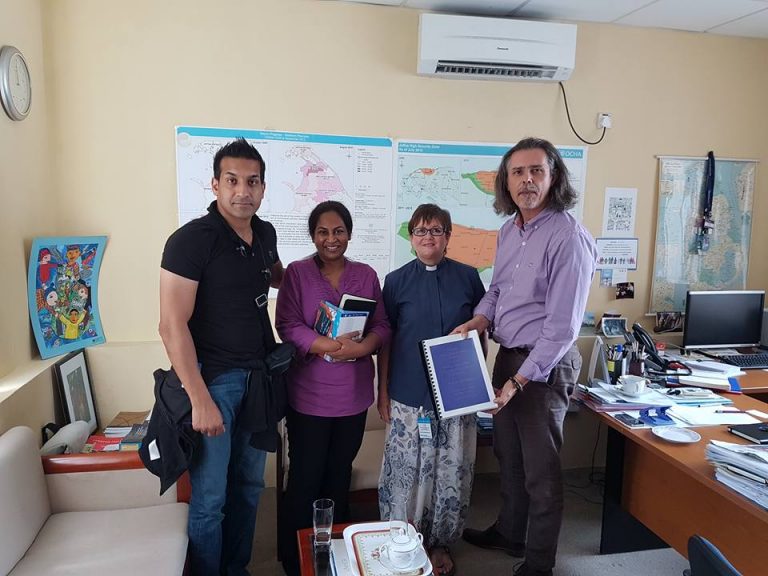Image of our former Chairman Wilson Chowdhry presenting a BPCA report on Christian persecution by Desmond Fernandes, to a Senior Protection Officer at the United Nations High Commission for Refugees at Sri Lanka in 2017.
We detail below the importance and significance of the findings of the UN Special Rapporteur’s report on violations of freedom of religion or belief in Sri Lanka.
In September 2015 after a landmark investigation the United Nations released a major report on serious human rights violations committed during the final stages of the Sri Lankan civil war and the surrounding period (2002-2011). The ‘OISL Report’ [1] asserted that violations perpetrated by both the Sri Lanka government and LTTE (‘Tamil Tiger’) forces, could amount to war crimes and crimes against humanity if established in a court of law.
A number of recommendations were set before Sri Lanka on how they might begin to address these violations in order to lay the foundations for a sustainable peace.
The national unity government that came to power in Sri Lanka in 2015, acting through the UN Human Rights Council, made a series of promises to deal with the legacy of the war; promises that included establishing mechanisms capable of investigating serious human rights violations and holding perpetrators to account. These can be read in the UN Human Rights Council (HRC) Resolution 30/1, which was co-sponsored by the government and unanimously adopted by HRC members in October 2015
Due to very limited progress the HRC adopted Resolution 34/1 (in March 2017) and Resolution 40/1 (in March 2019). These essentially continue the existing commitments from the original resolution while enhancing the monitoring mandate of the UN High Commissioner for Human Rights. Under the terms of the most recent resolution, the High Commissioner presented a written update to the HRC at the 43rd session (24th February – 20th March 2020), a more comprehensive report is also to be submitted to the 46th session (in March 2021).
The UN Special Rapporteur on Freedom of Religion or Belief’s ‘Visit to Sri Lanka’ report, which has just been presented at the UN Human Rights Council’s 43rd session (24 February – 20 March 2020, Agenda item 3), provides useful insights into the manner in which religious minorities in Sri Lanka – inclusive of Christians, Muslims, Hindus and Jehovah’s Witnesses – have suffered from extreme freedom of religion or belief violations since 2009.
Such findings effectively challenge the Government of Sri Lanka’s (GoSL) assertions – just made during its Interactive Dialogue with the Special Rapporteur (SR) regarding his report (A/HRC/43/48/Add.2) – that “the State possesses credible agencies, the capacity and the necessary legal framework to address the issues of concern. [The government of] Sri Lanka remains committed to protecting and promoting the freedom of conscience and religion of all its people”.
The government of Sri Lanka has also sought to misrepresent the scope of SR Ahmed Shaheed’s report by inaccurately and misleadingly stating that “it [is] unfortunate that the SR’s report has, to a large extent, sought to judge the space for freedom of religion or belief in Sri Lanka through the few months that followed the Easter Sunday attacks”. This is not the case. The SR’s report essentially assesses the situation in Sri Lanka from 2009 onwards (from the time that the military conflict with the LTTE ended).
“Ten years after the end of the lengthy ethnic conflict, there has been no closure on a number of issues arising from that conflict and which the Government had pledged to address at the UN Human Rights Council”, it concludes. “While there have been some elementary steps taken, lack of accountability and impunity remains a widespread concern, perpetuating a sense of insecurity among all religious communities. The transitional period has been marked by simmering tensions between the ethno-religious communities. These challenges appear to be related primarily to the state-religion relationship which offers majoritarian privileges, undermining equal protection of the law for minorities. Moreover, there have been recurrent inter-communal violence and religious extremism in the past years before the Easter bombings in 2019”.
For SR Ahmed Shaheed, “while the legal framework in Sri Lanka guarantees the right to freedom of religion or belief for everyone, in practice there are several challenges to the enjoyment of this right. Religious minorities face restrictions in the manifestation of their religion or belief, their places of worship are desecrated while their religious activities such as worship sessions are disrupted by locals and the authorities. There is difficulty for the minority religious communities to build new places of worship while some places were forced to close down due to arbitrary registration requirements. Non-Roman Catholic Christians are also exposed to numerous incidents of violent attack due to a suspicion of ‘unethical conversion’ and limitations on their right to proselytize. Aggressive campaigns by militant nationalist and religious groups against ethnic, religious and other minorities, particularly Muslims, are particularly concerning”.
The findings by the Special Rapporteur tally with the findings of our own book – due to be released in May, entitled ‘UK Home Office Denialism of the Persecution of Christians in Sri Lanka’. Authored by Desmond Fernandes, a former Senior Lecturer in Human Geography at De Montfort University, it provides extensive documentation drawn from a variety of sources (academic, public interest, investigative journalist, legal, church and non-church as well as parliamentary reports), to support the Special Rapporteur’s contention that “the right to proselytise is not fully protected in Sri Lanka…
Religious minorities face restrictions in the manifestation of their religion or belief such as proselytization, conversion, and building of places of worship in addition to numerous incidents of violent attacks”.
Desmond Fernandes’ book extensively documents the nature and extent of persecution of Christians in Sri Lanka and the scandalous way in which current UK Home Office Guidance, used by UK Visas and Immigration to make decisions in asylum and human rights applications, still continues to problematically assert the following regarding “religious minority groups” which “include Muslims, Christians and Hindus”: “In general, a person will not face a real risk of serious harm or persecution from state actors” in Sri Lanka “because of their religion … In general, a person will not face a real risk of serious harm or persecution from non-state or societal actors because of their religion … There is some societal discrimination and harassment, particularly against Evangelical Christians, but there are very few such incidents” (page 6).
The Home Office’s ‘Country Policy and Information Note (CPIN) Sri Lanka: Minority religious groups (Version 1.0 March 2018)’, in providing the above ‘guidance’, clarifies that it “provides” the latest “country of origin information (COI) and policy guidance to Home Office decision makers on handling particular types of protection and human rights claims. This includes whether claims are likely to justify the granting of asylum, humanitarian protection or discretionary leave and whether – in the event of a claim being refused – it is likely to be certifiable as ‘clearly unfounded’ under s94 of the Nationality, Immigration and Asylum Act 2002” (page 2).
We hope that the findings of our book, when placed alongside those of Special Rapporteur Ahmed Shaheed, other concerned analysts/organisations and the ‘Bishop of Truro’s Independent Review for the Foreign Secretary of FCO Support for Persecuted Christians’, will result in more appropriate, accurate and updated CPIN ‘guidance’ that correctly recognises the nature and extent of persecution of Christians and ‘Othered’ religious minorities in Sri Lanka.
The following findings of the Special Rapporteur should not be ignored: “Law enforcement and local Government officials allegedly use [a 2008] Circular to discriminate against religious minority groups and curtail their right to worship. It is also used retroactively to close non-mainline churches … Evangelical Christian churches in particular continue to report pressure and harassment by local authorities to close down places of worship because they were not registered, their prayer meetings and worship activities are also routinely denied permission to take place. Moreover, intimidation and attacks against clergy and church members; desecration of Evangelical churches and interference with religious activities are also perpetrated by local villagers and Buddhist monks …
“The Rapporteur … heard about an attack against four girls from the Assemblies of God community by a mob of 60 men with the professed intention to rape them. This further illustrates the additional vulnerability of religious minority women and girls”.
SR Ahmed Shaheed’s report further clarifies (citing examples) that “attacks on places of worship and disruption of prayer sessions of the religious minorities” – including that of Christians, Hindus and Muslims – “are not recent phenomena … In 2014, Ban Ki-moon, then UN Secretary-General, expressed his alarm and concern by ‘the rising level of attacks in Sri Lanka against religious minorities’. He noted that ‘Buddhist communities are being swept up by a rising tide of extremist sentiment against other groups’ … In addition, in 2016, the UN Special Rapporteur on Minority Issues and the UN Committee on the Elimination of Racial Discrimination expressed concern about the cases of desecration of places of worship, disruptions of religious services, denials of building permits to construct religious buildings and denials of burials in public cemeteries of members of ethnic or religious minorities”.
As genocide and human rights scholar Desmond Fernandes confirms, the Special Rapporteur’s report in no uncertain terms concludes that “one of the challenges the country faces is the lack of equality amongst religious communities … There is a general perception by the victims that perpetrators of hate speech are [additionally] free to continue their campaigns and cause harm without any legal repercussions. The minority communities are feeling extremely vulnerable with the constant threat of hate speech and hate crimes while they have no recourse for justice. Most of them have lost their faith in the State and law enforcement agencies after multiple traumas from the violence [directed against them. There] … are clear contemporary examples of hate speech and hate violence, politicising the ethnic and religious identities, targeting minority communities, in particular the Muslim community … It is also worth noting that such violence did not exclusively target Muslims; similar violence had been committed also against the Tamils and Christians at various points in time”.
As for the current Sri Lankan government, it should be noted that its rejection of these findings and conclusions of the SR’s report comes less than a week after it formally informed the UN Human Rights Council (UNHRC) of its decision to withdraw from co-sponsoring resolution UNHRC resolution 30/1 that was aimed at addressing war crimes and accountability issues in the country. As Amnesty International’s South Asia researcher Thyagi Ruwanpathirana noted at the time: “Sri Lanka has a long history of failed domestic accountability mechanisms. Their successive failures have bitterly disappointed victims of human rights abuses and violations, many of whom have waited years for an outcome that has failed to materialize. They need an international mechanism that is both trusted and can be effective”.
Juliet Chowdhry, Trustee for BACA, said:
“Our publication on Sri Lankan minority persecution was commissioned immediately after we met with leaders of the community following the 2019 Easter bomb attacks.
“During our meetings and communications we were informed about their despondency that so little had changed since the end of the civil war.
“Assurances made for change made by the Government of Sri Lanka never came to fruition and known perpetrators of war crimes have thus far escaped justice.
“By withdrawing from the UNHRC co-sponsored resolution the Sri Lankan Government has exhibited little or no passion to correct the wrongs of the past and it has been a devastating blow to campaigners.
“Moreover, societal divisions have persisted and persecution in the country is evidently increasing, leaving minority people’s hopes for sustainable peace at it’s lowest ebb.
“We continue to pray for Christians in Sri Lanka and within the whole of the South Asian subcontinent.”
Background notes:
In 2010, the First Session of the Permanent Peoples’ Tribunal (PPT) on Sri Lanka (2010), rooted in the historical experiences of the Russell Tribunals on Vietnam (1966-67) and on the dictatorships in Latin America (1974-76), established that War Crimes and Crimes against Humanity had been committed by the Government of Sri Lanka and were continuing up to the moment of the judgement.
The Second Session of the PPT in 2013, organised by the International Human Rights Association – Bremen and the Irish Forum for Peace in Sri Lanka, based on the strength of the evidence presented, reached the consensus ruling that the state of Sri Lanka was guilty of the crime of genocide against Eelam Tamils and that the consequences of the genocide had continued to the date of the judgement with ongoing acts of genocide also continuing against Eelam Tamils. The Tribunal additionally found, amongst other things, that UK government complicity in the genocide during the period of the armed struggle and its repression was overt and explicit. Active US complicity in the genocide was also identified.


